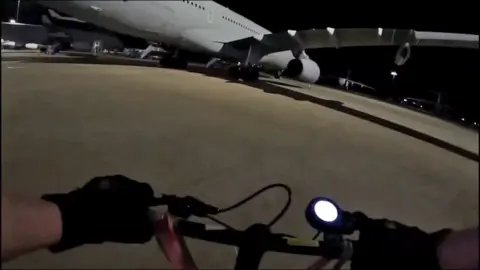The recent incident at RAF Brize Norton, which involved pro-Palestinian activists breaking into the base and vandalizing military aircraft, has raised significant alarm within the UK government and military circles. This breach not only implicates severe security concerns but also highlights the continuing tensions surrounding military involvement in overseas conflicts, particularly in relation to the ongoing situation in Gaza.
On June 20, 2025, reports emerged that activists, associated with the group Palestine Action, managed to infiltrate the Oxfordshire airbase, an essential hub for UK military logistics, and spray-painted two military planes with red paint. Footage shared on social media depicted a chaotic scene, with one individual riding a scooter towards an Airbus Voyager, an air-to-air refueling tanker. In an act of protest, they proceeded to spray paint into the jet’s engine, effectively aiming to immobilize these strategic assets. Palestine Action asserted that the activists successfully evaded security measures, claiming that they had rendered the aircraft “out of service.”
The British Ministry of Defence responded strongly to this act of vandalism. They condemned the incident as an unacceptable violation of Royal Air Force property and reinforced their commitment to working with law enforcement to investigate the occurrence further. The gravity of the security implications of such an intrusion prompted Cabinet Minister Lisa Nandy to describe the event as “deeply concerning,” asserting that the government would take action against individuals whom they perceive as disregarding national security protocols. This statement reflects the delicate balance the government must navigate when addressing public dissent while maintaining the integrity of national defense mechanisms.
As discussions surrounding military actions in the Gaza Strip continue, Palestine Action’s spokesperson emphasized the contradiction in UK foreign policy. They pointed out that while Britain condemns the actions of the Israeli government publicly, it simultaneously facilitates military operations that include supplying arms and facilitating refueling for U.S. and Israeli military operations. This perspective underscores the broader debate regarding the ethical implications of military aid and the moral responsibilities of governments in the context of international conflict.
RAF Brize Norton is not only crucial for UK air transport but is also responsible for a range of military operations, including logistics for bases like RAF Akrotiri in Cyprus, from which reconnaissance flights have been conducted over Gaza. The protest activities of Palestine Action are part of a broader movement that has seen activists targeting arms manufacturers and military assets since hostilities reignited in Gaza. Their previous actions include vandalizing U.S. military aircraft in Ireland, indicating a pattern of direct action aimed at criticizing perceived complicity in military injustices.
The methodology employed by the activists in this latest incident involved using repurposed fire extinguishers filled with red paint to deface the planes and reported additional damage caused with crowbars, although this was not clearly documented in the footage shared. Video evidence indicates that the activists were able to move freely within the premises of the airbase, further questioning the effectiveness of the security protocols in place at such a significant military installation.
In the aftermath of this event, prominent figures, including Lord West, a former head of the Royal Navy, expressed concerns about the implications of such security breaches on national defense. He reiterated that allowing such incidents to occur jeopardizes the very foundations of national security, indicating a widespread sentiment that this incident could set a dangerous precedent.
Overall, the break-in at RAF Brize Norton stands as a stark reminder of the contentious issues surrounding military engagement in global conflicts. It raises critical questions about the responsibility of governments to protect their military assets while also addressing the root causes of activism and dissent related to international military actions. The larger question of how democracies balance security with civil liberties remains at the forefront of discussions in the wake of this incident.



